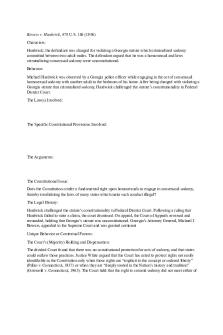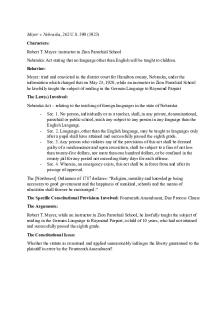Wickard v Filburn CB - Lecture notes case brief PDF

| Title | Wickard v Filburn CB - Lecture notes case brief |
|---|---|
| Author | Jozie Lowe |
| Course | Constit Law I/Institutnl Power |
| Institution | University of The Incarnate Word |
| Pages | 2 |
| File Size | 88.5 KB |
| File Type | |
| Total Downloads | 24 |
| Total Views | 139 |
Summary
professor metroka...
Description
Wickard v. Filburn, 317 U.S. 111 (1942) Characters: Appellee [farmer Roscoe Filburn] and the Secretary of Agriculture of the United States [Claude Wickard]. Behavior: Ohio farmer Roscoe Filburn was allowed to plant 11.1 acres under the AAA. Instead, he planted 23. Filburn argued that growing wheat and consuming it on the same farm, without any wheat or money changing hands, could not be “commerce among several states”. Department of Agriculture did not care what Filburn did with the wheat. It sought to control the national supply of a commodity for which there was an interstate and international market. To do that, it limited the total amount of wheat that could be grown. The Law(s) Involved: Agricultural Adjustment Act of 1933 (the act invades the reserved rights of the state. It is a statutory plan to regulate and control agricultural production, a matter beyond the powers delegated to the federal government), Agricultural Adjustment Act of 1938 (proposed limits on that year’s production of wheat, and a nationwide referendum of wheat farmers approved the quotas), Commerce Clause, Due Process Clause (Fifth Amendment), United States v. Darby, Gibbons v. Ogden, Interstate Commerce Act, Sherman Anti-Trust Act, United States v. E.C. Knight Co The Specific Constitutional Provision Involved: Commerce Clause (Congress the power “to regulate commerce with foreign nations, and among the several states, and with the Indian tribes.”), Due Process Clause (Due process deals with the administration of justice and thus the due process clause acts as a safeguard from arbitrary denial of life, liberty, or property by the government outside the sanction of law). The Arguments: The appellee [farmer Roscoe Filburn] filed his complaint against the Secretary of Agriculture of the United States [Claude Wickard], three members of the County Agricultural Conservation Committee for Montgomery County, Ohio, and a member of the State Agricultural Conservation Committee for Ohio. He sought to enjoin enforcement against himself of the marketing penalty imposed. He also sought a declaratory judgement that the wheat marketing quota provisions of the Act as amended and applicable to him were unconstitutional. The Appellee, Filburn (Appellee), produced wheat only for personal and local consumption. He was penalized for growing wheat in excess of his allotment allowed by the Department of Agriculture The Constitutional Issue: May Congress regulate purely intrastate activities under the commerce clause? Whether Congress may regulate the overall production of a good, where not all of the good’s production is bought and sold across state lines. The Legal History: The below held, with one judge dissenting, that the [fine against Filburn was improper.] The Secretary and his co-defendants have appealed. Unique Background or Contextual Factors:
The Court’s (Majority) Holding and Dispensation: Yes. Appeals court ruling reversed and remanded. Although the wheat may be entirely for personal consumption, it does compete for wheat in commerce, by taking away the demand for wheat by the one who grows it. As the one growing the wheat does not have to buy wheat, the demand for wheat goes down. When viewed in the aggregate (if everyone overgrew wheat “for personal consumption”), this decrease in demand would have a significant effect on interstate commerce. The Supreme Court of the United States (Supreme Court) acknowledges that the effect of the single farmer may well be negligible to interstate commerce, but when viewed in the aggregate of all farmers “similarly situated” it may significantly affect the value of wheat in commerce. The Court’s Expressed Reasoning (The Majority Opinion): Commerce Clause gives Congress the power to regulate prices in the industry, and this law was rationally related to that legitimate goal.. He pointed out that Filburn would have needed to buy wheat if he had not used his own wheat for personal consumption, so his choice still affected the national economy and interstate commerce by removing a buyer from the market. Although this impact was admittedly negligible, the impact would be significant if similarly situated farmers followed Filburn's example. Jackson's reasoning led him to hold that Congress could even regulate activity occurring entirely within a single state under the Commerce Clause and even if each individual activity had a trivial effect on interstate commerce, as long as the intrastate activity viewed in the aggregate would have a substantial effect on interstate commerce. To this extent, he repudiated Court precedents that had tried to determine whether an activity was local or classify its effects as direct or indirect. Concurring and Dissenting Opinions: None Personal Notes:...
Similar Free PDFs

Full CB lecture notes
- 52 Pages

Lubitz v Wells Case Brief Notes
- 2 Pages

Wesson v. Walmart - case brief
- 2 Pages

Morse v Frederick Case Brief
- 2 Pages
Popular Institutions
- Tinajero National High School - Annex
- Politeknik Caltex Riau
- Yokohama City University
- SGT University
- University of Al-Qadisiyah
- Divine Word College of Vigan
- Techniek College Rotterdam
- Universidade de Santiago
- Universiti Teknologi MARA Cawangan Johor Kampus Pasir Gudang
- Poltekkes Kemenkes Yogyakarta
- Baguio City National High School
- Colegio san marcos
- preparatoria uno
- Centro de Bachillerato Tecnológico Industrial y de Servicios No. 107
- Dalian Maritime University
- Quang Trung Secondary School
- Colegio Tecnológico en Informática
- Corporación Regional de Educación Superior
- Grupo CEDVA
- Dar Al Uloom University
- Centro de Estudios Preuniversitarios de la Universidad Nacional de Ingeniería
- 上智大学
- Aakash International School, Nuna Majara
- San Felipe Neri Catholic School
- Kang Chiao International School - New Taipei City
- Misamis Occidental National High School
- Institución Educativa Escuela Normal Juan Ladrilleros
- Kolehiyo ng Pantukan
- Batanes State College
- Instituto Continental
- Sekolah Menengah Kejuruan Kesehatan Kaltara (Tarakan)
- Colegio de La Inmaculada Concepcion - Cebu











